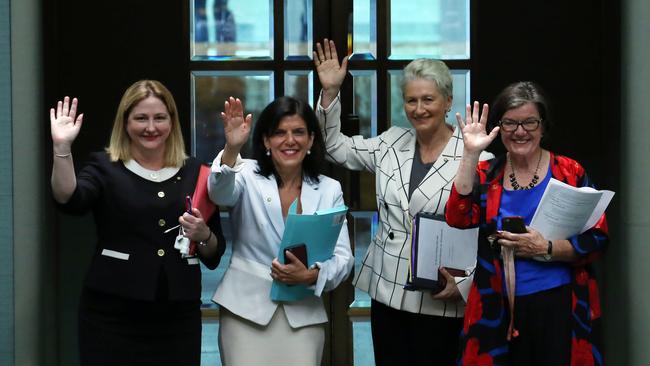
The obsession of sections of the ABC with the independents, especially those who will contest a winnable seat against the Coalition at the next election, was evident on Monday’s Q&A.
Unlike the BBC’s Question Time, on which Q&A is modelled, the Australian program is not spontaneous. Many of the questions are approved by Q&A producer Peter McEvoy before the questioner gets a call from presenter Tony Jones. Question Time’s presenter Fiona Bruce calls on audience members without knowing what is on their minds.
On Monday’s Q&A, Scott Gannon got the call to ask the first question. It was this: “With the release of the banking royal commission’s final report and the shocking revelation of widespread malpractice that it uncovered, will you ensure that all recommendations, including any civil or criminal prosecutions, are implemented?” The panel comprised four independents (Julia Banks, Kerryn Phelps, Rebekha Sharkie and Andrew Wilkie) and one Greens MP (Adam Bandt). All oppose Scott Morrison’s government from the left-of-centre perspective. The only minor party member who opposes the Coalition from a right-of-centre perspective, Bob Katter, did not appear on the program.
Jones called on Banks to respond first. He overlooked the point that in the current parliament the likes of Bandt, Banks, Phelps, Sharkie and Wilkie cannot “ensure” anything. Even if they all vote together they have a total of five votes, well short of the 76 votes required for a majority. Clearly the independents and small parties cannot achieve anything without the support of the Coalition or the Labor Party.
The next election is likely to be held in the first half of May. On ABC TV’s 7.30 program on Monday, Laura Tingle suggested that an early election might be called. This is unlikely. If Labor gains a big victory, as many commentators expect, independents and minor parties would play a minor role in the next parliament. Even a narrow Coalition victory would not necessarily bring about a situation whereby a Morrison government was dependent on independents’ support — any Greens parliamentarians would almost certainly support Labor.
Tingle also reported the Coalition is arguing that if it is defeated on Phelps’s planned medivac bill providing for asylum-seekers on Manus Island and Nauru to come to Australia on the recommendation of two medical doctors, then “Labor might force a snap election”. There is no historical precedent whereby Labor could force a government to the polls based on defeat on a motion in the House of Representatives on anything less than a formal vote of no confidence. The history is set out in Geoffrey Sawer’s excellent two-volume work Australian Federal Politics and Law (MUP).
Some ABC journalists refer to the fact that Stanley Bruce and Earle Page’s Nationalist-Country coalition lost a vote in September 1929, after which Bruce, the prime minister, successfully sought a dissolution of parliament from the governor-general. Labor won the subsequent election.
The fact is that this was Bruce’s decision — it was not forced on him by Labor. The Bruce government was defeated on the floor of the parliament over the maritime industries bill. Two independents voted with Labor. As did four Nationalists — Billy Hughes, EA Mann, WM Marks and GA Maxwell.
If Morrison loses a vote in parliament in the next two weeks, it will be because he has not been able to acquire the support of sufficient independents or minor party parliamentarians. No Liberal Party or Nationals members are expected to cross the floor. In September 1929, however, four Nationalists crossed the floor to defeat the Coalition’s legislation.
Back then, Bruce knew that he had lost the support of four of his one-time parliamentary colleagues, led by Hughes. Consequently he understood that he could no longer confidently muster a majority in the house and advised the governor-general accordingly. There is no comparison with Morrison’s position today — provided Labor does not initiate a no-confidence vote that is supported by all independents and minor party representatives.
Since the formation of the two-party system, the only time a government has been forced to an election following a defeat in the house occurred in October 1941. Labor leader John Curtin moved what amounted to a vote of no confidence in the Country Party-United Australia Party government led by Arthur Fadden.
Fadden’s defeat occurred when two independents (AW Coles and Alexander Wilson), who had supported the Coalition since the 1940 election, crossed the floor and announced they had switched their support to Labor. Having lost a no-confidence motion in such circumstances, Fadden had no option but to go to the governor-general and formally advise that Curtin should be commissioned to form a government. Fadden’s advice was accepted.
It is not at all clear that Labor, independents and minor parties would all see a reason to move a vote of no confidence against the Morrison government with an election due within a few months.
It remains to be seen how the independents who starred on Q&A last Monday will perform at the election. Wilkie, who usually receives Liberal Party preferences, is likely to hold off Labor in Denison (based on Hobart). Banks, however, is likely to struggle to win the Melbourne-based seat of Flinders (currently held by the Coalition’s Greg Hunt, although Labor is a possibility in this seat).
It is not clear how well Phelps and Sharkie will perform in Wentworth (Sydney) and Mayo (South Australia) respectively. Especially if their Liberal Party opponents (Dave Sharma and Georgina Downer) are able to identify them with Labor policies on tax and franking credits and the Greens’ open borders approach to asylum-seekers.
A repeat of Monday’s Q&A is far from assured after the election.
Gerard Henderson is executive director of the Sydney Institute. His Media Watch Dog blog can be found at theaustralian.com.au.




To join the conversation, please log in. Don't have an account? Register
Join the conversation, you are commenting as Logout